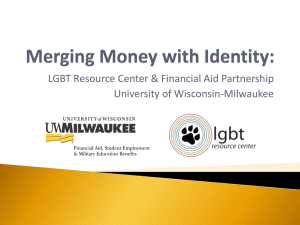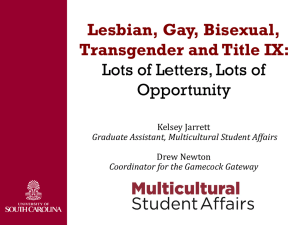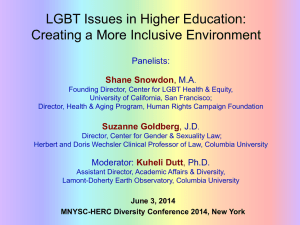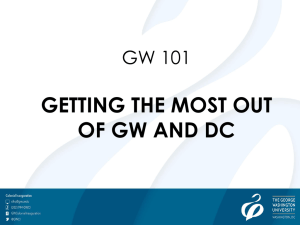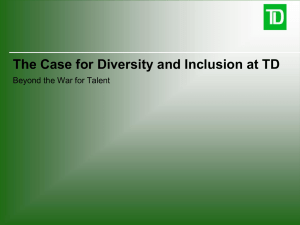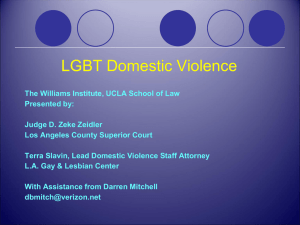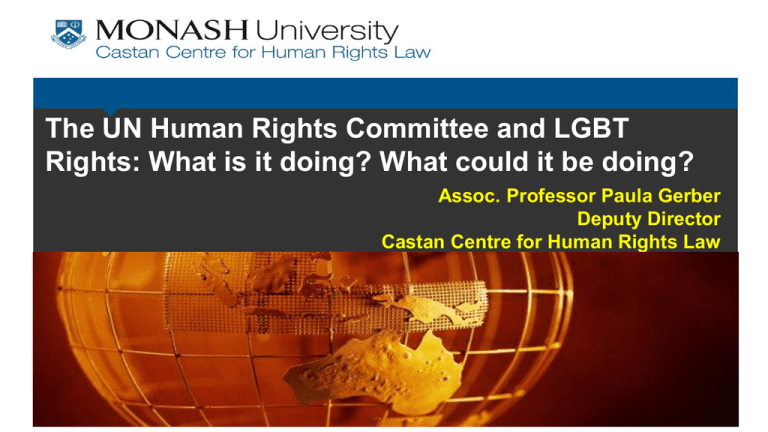
The UN Human Rights Committee and LGBT
Rights: What is it doing? What could it be doing?
Assoc. Professor Paula Gerber
Deputy Director
Castan Centre for Human Rights Law
The UN Human Rights Committee and LGBT Rights
26th July 2013
2
The UN Human Rights Committee and LGBT Rights
26th July 2013
3
• There are 78 countries which continue to criminalise samesex sexual behaviour.
• Legacy of the British Empire? – 42 of these countries are
part of the 54 member Commonwealth of Nations.
• Homosexual conduct is punishable by death in 5 of these
countries.
The UN Human Rights Committee and LGBT Rights
26th July 2013
4
Application of these Laws
• December 2012, a Cameroon appellate court
upheld a 3 year jail sentence imposed on
Jean-Claude Roger Mbede, for ‘homosexuality’
on the basis of a text message he sent to another man.
• In May 2010, in Malawi, a judge imposed the maximum
sentence of 14 years imprisonment with hard labour on a
gay couple convicted of gross indecency and unnatural
acts, after holding an engagement ceremony.
5
What is HR Committee doing to Protect
and Promote LGBT Rights?
Concluding Observations following Periodic Reports &
Review;
General Comments; and
Decisions on Individual Complaints
The UN Human Rights Committee and LGBT Rights
26th July 2013
6
Why consider Concluding Observations?
Concluding Observations ‘have been elevated to be the
primary record of the findings and recommendations
regarding each State Party under review [and] they
constitute important interpretative tools for the
respective treaties’.
Nevertheless, it has been observed that ‘considerable scope
remains for the enhancement of concluding
observations and follow-up procedures’.
[Prof. Michael O’Flaherty]
The UN Human Rights Committee and LGBT Rights
26th July 2013
7
Concluding Observations
My research examines 10 years of HR Committee’s
Concluding Observations – from 2003 - 2013.
– 136 States reviewed.
– 45 Concluding Observations mentioned LGBT rights.
This amounts to LGBT rights being commented on in 33.1%
of states reviewed.
The UN Human Rights Committee and LGBT Rights
26th July 2013
8
Concluding Observations cont.
Comments tended to fall into 2 categories:
– Anti-discrimination measures:
• failure to prohibit employment-related discrimination;
• failure to include the category of sexual orientation in
broad anti-discrimination legal regimes;
• inadequate institutional response to discriminatory
attitudes and violence; and
• unequal ages of consent for sexual activity; and
– Decriminalisation of homosexual activity.
The UN Human Rights Committee and LGBT Rights
26th July 2013
9
Quantitative Analysis
In the decade examined, HR Committee increased its
comments relating to LGBT issues:
– In 2004, it reviewed 15 State Parties, but only made 4
comments on LGBT issues.
– In 2013, it also reviewed 15 State Parties’ reports, but this
time it made 12 observations on LGBT issues.
The UN Human Rights Committee and LGBT Rights
26th July 2013
10
Qualitative Analysis
Where a State was reviewed twice in the 10 year
period, there was a marked difference in comments:
– Philippines in 2003: ‘the State party to take the necessary steps to
adopt legislation explicitly prohibiting discrimination … related to
sexual orientation’.
– Philippines in 2012: reference to the ‘Ang Ladlad case’, a
‘statement of the delegation that it will take up a leadership role to
promote [LGBT] rights’, ‘the “grave scandal” provision provided
under article 200 of the Revised Penal Code’ and the
‘comprehensive anti-discrimination bill that prohibits discrimination
on grounds of sexual orientation and gender identity’.
The UN Human Rights Committee and LGBT Rights
26th July 2013
11
1. More In-depth Comments
Later Concluding Observations are significantly more
detailed, focused and contain actionable comments.
The more nuanced and comprehensive the comments of the
Committee the more likely it is that the State Party will be
able to respond and report back to the
Committee at the next reporting cycle.
The UN Human Rights Committee and LGBT Rights
26th July 2013
12
2. Changes in use of identity
terms
Before 2009, the dominant terminology for referring to
LGBT persons was “sexual orientation”.
In October 2009, the Committee when reviewing Russia,
used the term ‘LGBT’ for the first time.
Since then, the use of the term ‘LGBT’ has become
ubiquitous.
The UN Human Rights Committee and LGBT Rights
26th July 2013
13
Changes in use of identity terms cont.
Around the same time, the Committee also began using the
phrase ‘gender identity and activity’.
In 2 instances in 2012, Committee mentioned ‘intersex’
persons (in relation to Kenya and Guatemala) and in one of
those instances also used the more expansive acronym,
LGBTI (the ‘I’ denoting intersex) (in relation
to Kenya).
The UN Human Rights Committee and LGBT Rights
26th July 2013
14
Changes in use of identity terms cont.
Committee’s use of the terms ‘LGBT’, ‘LGBTI’, ‘gender identity’ and
‘intersex’ signals a greater sensitivity to the diversity of sexuality, because
as compared with “sexual orientation”, LGBT specifically encompasses
four distinct segments of the homosexual population.
BUT the Committee has used the umbrella term ‘LGBT’ inappropriately on
several occasions. E.g. when expressing concern about transsexual
women being placed in rehabilitation centres to undergo ‘sexual
reorientation treatments’. This demonstrates a misunderstanding of the
nature of transsexuality to refer to ‘sexual orientation’
rather than gender identity.
The UN Human Rights Committee and LGBT Rights
26th July 2013
15
3. Failure to comment on the
decriminalisation of same-sex sexual activity
Over the decade 2003-2013, 13 Concluding Observations condemned a
State for its criminalisation of same-sex sexual activity.
However, 31 States that were reviewed had criminal laws relating to
same-sex sexual.
Thus, only 41% were commented on by the HR
Committee
The UN Human Rights Committee and LGBT Rights
26th July 2013
16
Inconsistency in Comments
In 2011, the in relation to Togo it was noted that
‘the Committee remains concerned about the
criminalization of sexual relations between
consenting adults of the same sex, punishable by
1 to 3 years imprisonment and a fine’.
In 2011, in relation to Seychelles, where samesex sexual activity is also criminal and punishable
by 14 years imprisonment, No comment was
made.
The UN Human Rights Committee and LGBT Rights
26th July 2013
17
Explanation?
The UN Human Rights Committee and LGBT Rights
26th July 2013
18
4. Lack of specificity and actionable
recommendations
Treaty committees should give targeted, specific, measurable, achievable
and time-bound recommendations.
HR Committee often made observations regarding LGBT issues that were
general, vague and offered little guidance to the State Party.
E.g. it made recommendations that State Parties:
– ‘provide effective protection of LGBT persons’ (Dominican Republic); &
– ‘launch a campaign’ (Guatemala).
The UN Human Rights Committee and LGBT Rights
26th July 2013
19
Use of Generic Statements
Committee also tends to repeat the same generic statement ad
nauseum, which demonstrates a lack of deeper examination of the
causes of and solutions to the infringement LGBT rights.
By using simple generic comments, with no consideration to the different
circumstances of the State Parties, and the ways in which a State Party
might implement a campaign to fight discrimination, the Committee
wastes the opportunity to make constructive,
actionable recommendations.
The UN Human Rights Committee and LGBT Rights
26th July 2013
20
Positive Aspects of HR Committee’s
Concluding Observations
1. Increased number of references to LGBT rights.
2. Increased depth and detail in the observations.
3. Greater use of LGBT-precise language.
The UN Human Rights Committee and LGBT Rights
26th July 2013
21
Negative Aspects of HR Committee’s
Concluding Observations
HR Committee’s Concluding Observations fail to
consistently address, in a systematic manner, the
most flagrant violation of LGBT rights, i.e. the continued
criminalisation of homosexuality in numerous states around
the world.
Committee needs to adopt a more comprehensive and
nuanced treatment of breaches of the rights of LGBT
persons.
The UN Human Rights Committee and LGBT Rights
26th July 2013
22
General Comments
HR Committee states that General Comments represent ‘its interpretation
of the content of human rights provisions’ and are focused on ‘thematic
issues or methods of work’.
Otto says General Comments are ‘quasi-judicial’ and carry
‘enormous political and moral weight’.
Thomas Buergenthal (former ICJ judge) says General Comments
enable treaty bodies to analyse and pronounce on difficult issues
of interpretation in a form similar to the highly influential advisory
opinions of international tribunals.
The UN Human Rights Committee and LGBT Rights
26th July 2013
23
General Comments
Collectively, UN treaty committees have published over
100 General Comments.
HR Committee has been the most prolific: 34 (cf
Committee on ESC Rights: 21).
BUT, how many of the HR Committee’s
34 General Comments have addressed
LGBT rights?
The UN Human Rights Committee and LGBT Rights
26th July 2013
24
Answer:
The UN Human Rights Committee and LGBT Rights
26th July 2013
25
HR Committee does not compare
favourably to other treaty Committees
Presentation title
28th February 2011
26
Missed Opportunities
General Comment 18 (1989) – Discrimination under
Articles 2 & 26.
General Comment 28 (2001) – Equality of rights
between men and women.
General Comment 31 (2004) – The Nature of
the General Legal Obligation Imposed
on States Parties to the Covenant.
The UN Human Rights Committee and LGBT Rights
26th July 2013
27
But wait... Draft General Comment 35
32 years of silence … and then in 2012, Draft GC 35.
Focused on Article 9 (liberty and security of person). It provides that:
“The right to “security of person” in article 9 ... obliges States parties to
take appropriate measures to protect individuals, whether detained or
non-detained, from known threats to life or bodily integrity proceeding
from either governmental or private sources. States parties must
respond appropriately to patterns of violence against categories of
victims such as … violence against sexual minorities.” [Emphasis
added].
The UN Human Rights Committee and LGBT Rights
26th July 2013
28
Draft General Comment 35
The approach appears to be to situate sexuality
within a more comprehensive human rights
framework and to explore commonalities
between disparate struggles.
This is consistent with the strategy which Ignacio Saiz has
proffered as an explanation for the significant penetration of LGBT
issues at the European Union which is much greater than within
the UN.
Committee will resume its discussion of this draft GC at its next
session. It has an open timetable for the finalisation of the
Comment.
The UN Human Rights Committee and LGBT Rights
26th July 2013
29
Conclusion re General Comments
Lots of room for improvement:
– Committee needs to make a
concerted effort to include LGBT
persons where relevant in future
General Comments; and/or
– Draft a General Comment that
focuses specifically on the
application of ICCPR to protecting
the rights of sexual minorities
The UN Human Rights Committee and LGBT Rights
26th July 2013
30
Decisions on Individual Complaints
There have been 5 HR Committee decisions relating to
complaints of discrimination by sexual minorities, namely:
Toonen v Australia (1994)
Young v Australia (2000)
Joslin v New Zealand (2002)
X v Colombia (2005)
Fedotova v Russian Federation (2012)
The UN Human Rights Committee and LGBT Rights
26th July 2013
31
Toonen v Australia (1994)
Nick Toonen, a gay activist, challenged two provisions of
the Tasmanian Criminal Code which criminalised all
forms of sexual contact between consenting adult
men in
private.
Although there had been no prosecutions or investigations under the
relevant Sections since 1984, the risk of prosecution or investigation
remained.
In a landmark decision, HR Committee ruled:
– Tasmania’s criminal laws breached Art 17 (“No one shall be
subjected to arbitrary or unlawful interference with his privacy”) and
– “the reference to "sex" in articles 2, paragraph 1, and 26 is to be
taken as including sexual orientation”.
The UN Human Rights Committee and LGBT Rights
26th July 2013
32
Toonen v Australia cont.
Joseph, Schultz & Castan note that: “the HRC was clearly influenced by
the fact that all other Australian states had repealed such laws, and that
there was ‘no consensus’ regarding the appropriateness of the laws in
Tasmania This decision indicated that the ICCPR could potentially be
interpreted in a relativist manner — perhaps similar laws in a different
State with no comparable record of tolerance and acceptance of
homosexuality would survive a similar challenge.”
BUT they also note that “since the Toonen decision in 1994
the HRC has clearly exhibited disapproval of culturally
relativist arguments.”
Presentation title
,
28th February 2011
33
Young v Australia (2003)
Edward Young was in a same-sex relationship with a Mr. C
for 38 years.
He brought a complaint against Australia to the HR
Committee, alleging that the Government’s decision to deny
him a veteran’s pension was a breach of Art 26 of the ICCPR.
S13 of the Veteran's Entitlement Act limited veterans
pensions to opposite-sex couples.
The UN Human Rights Committee and LGBT Rights
26th July 2013
34
Young v Australia cont.
HR Committee, citing with approval the decision in
Toonen, found that Mr Young had been
discriminated against under Article 26 of the
ICCPR and was entitled to an effective remedy,
including the reconsideration of his pension.
This decision affirms that Article 26 applies to
discrimination based on sexual orientation.
Presentation title
28th February 2011
35
X v Columbia (2005)
X’s same-sex partner of 22 years died, and he applied
to have
his partner’s pension transferred to him. Colombia
law
did not allow for the transfer of pensions to same-sex partners. Columbia
argued that the measures were designed to protect heterosexual couples
including married and de facto couples, and were not meant to harm
homosexual couples.
HR Committee found there was no valid basis for differentiating between
heterosexual couples and same-sex couples, and accordingly found that
“the State party has violated article 26 of the Covenant by denying the
author’s right to his life partner’s pension on the basis of his sexual
orientation.”
The UN Human Rights Committee and LGBT Rights
26th July 2013
36
Joslin v New Zealand (2002)
2 lesbian couples claimed the NZ Marriage Act, by precluding
same-sex couples from marrying violated the following
provisions of the ICCPR:
– Art. 23 (right to marry) read in conjunction with Art 2 (nondiscrimination);
– Art 16 (recognition as a person before the law);
– Art 17 (privacy); and
– Art 26 (non-discrimination).
The UN Human Rights Committee and LGBT Rights
26th July 2013
37
Joslin v New Zealand cont.
The HRC did not consider Art 26 on the
basis that the specific rule in Art 23
overruled the other more general rules.
It is likely that the HRC would have
struggled to justify an argument that New
Zealand’s Marriage Act is not
discriminatory, if it had specifically
considered the Article 26 claim.
Presentation title
28th February 2011
38
Joslin a Product of its Time?
In 2002, only one country had legalised same-sex marriage (Netherlands
in 2001).
Perhaps the case was brought prematurely?
Today, 15 countries have marriage equality, including New Zealand!
With changing societal attitudes to same-sex marriage and homosexuality
in general, it is likely that Article 23 will, over time,
come to be interpreted through the lens of
Articles 2 & 26.
Fedotova v Russian Federation (2012)
Irina Fedotova displayed posters that declared “Homosexuality is
normal” and “I am proud of my homosexuality” near a secondary
school, in order to promote tolerance towards gay and lesbian
individuals in the Russian Federation.
She was convicted under laws that criminalise “propaganda of
homosexuality (sexual act between men or lesbianism) among minors”
and fined 1,500 Russian roubles.
Fedotova argued that the conviction was a breach of her right to
freedom of expression under Article 19 of the ICCPR.
The UN Human Rights Committee and LGBT Rights
26th July 2013
40
Fedotova cont.
Committee noted that the law criminalised ““public actions aimed
at propaganda of homosexuality (sexual act between men or lesbianism)” –
as opposed to propaganda of heterosexuality or sexuality generally –
among minors. With reference to its earlier jurisprudence, the Committee
recalls that the prohibition against discrimination under article 26 comprises
also discrimination based on sexual orientation.” [citing Toonen v. Australia,
Young v. Australia, and X. v. Colombia].
Committee found that the law “amounted to a violation of her rights under
article 19, paragraph 2, read in conjunction with article 26 of the Covenant”
and the State Party had failed to demonstrate that it was necessary for one
of the legitimate purposes of Article 19(3).
Presentation title
28th February 2011
41
Conclusion re Individual Communications
Scorecard on individual communications by
sexual minorities – 4:1.
Given the largely positive decisions from the
HR Committee on individual
communications by sexual minorities
alleging breaches of ICCPR, civil society
would be well advised to support LGBT
persons bringing complaints of
discrimination to this treaty committee.
The UN Human Rights Committee and LGBT Rights
26th July 2013
42
Report card on the HR Committee’s
efforts regarding LGBT persons:
Subject Area
Grade
Comment
Concluding
Observations
B+
Need to work on
concentration and
consistency
General Comments
D
Significant room for
improvement
Individual
Communications
A
Excellent effort. Keep
up the good work.
The UN Human Rights Committee and LGBT Rights
26th July 2013
43


